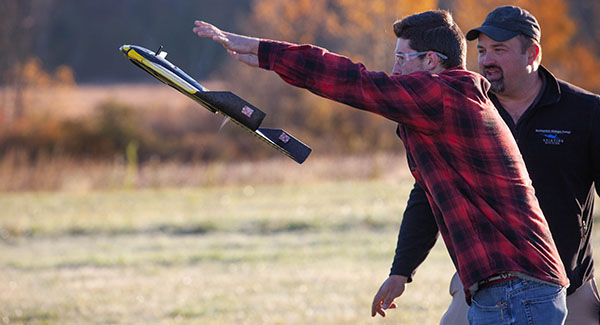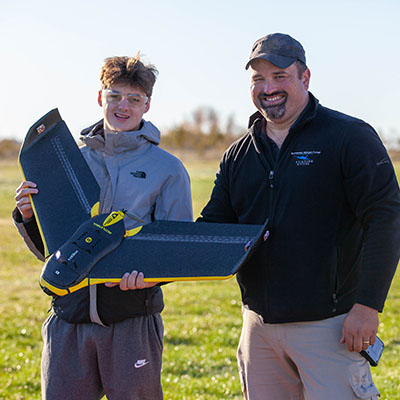January 25, 2023

UAS instructor Carl Rocheleau works with students at NMC’s UAS training property in Yuba.
A new, standalone degree for NMC’s drone education program will position it for further growth as the industry continues to expand.
Starting this fall, NMC will offer an associate degree in Uncrewed Aerial Systems (UAS), replacing the current UAS specialization within the Engineering Technology associate degree. A UAS certificate is also offered.
 Creating a standalone UAS degree creates a clearer path for students and allows NMC to prepare for future industry demand, said UAS program coordinator Tony Sauerbrey (right).
Creating a standalone UAS degree creates a clearer path for students and allows NMC to prepare for future industry demand, said UAS program coordinator Tony Sauerbrey (right).
“Going forward, the new degree will give us more flexibility to add classes as the industry changes,” Sauerbrey said. Additional credentials will be needed for more advanced operations, such as Beyond Visual Line of Sight (BVLOS), when new federal regulations are issued. That’s expected in the next few years.
Also changing is the first word of the UAS acronym. Formerly called Unmanned Aerial Systems, switching to Uncrewed keeps the college aligned with industry, Sauerbrey said. NMC also has objectives in its strategic plan that call for inclusive and equitable language across the college by 2025.
“The entire aviation industry has begun adopting new, gender-neutral terminology, from the FAA on down. As we made plans for this degree it was perfect timing for us to make the change as well,” Sauerbrey said. “As training on UAS is further integrated at the high school level, we expect to see an increase in interest from female students.”
Currently about 60 students are enrolled in the UAS degree program, with 25 graduating in a typical year. Another 10 students are enrolled in the certificate program.
 NMC first offered drone classes in 2010, a foresighted curricular addition. At the time, drones, were mostly a military tool. But Sauerbrey, then NMC’s chief flight instructor, and others in the college’s traditional crewed Aviation program spied opportunity ahead. The Engineering Tech degree with UAS specialty debuted in 2013. The FAA established a commercial license in 2016. Today, drones are used to inspect crop health and infrastructure integrity, photograph and sell real estate, conduct land surveys and monitor everything from shoreline erosion to invasive species.
NMC first offered drone classes in 2010, a foresighted curricular addition. At the time, drones, were mostly a military tool. But Sauerbrey, then NMC’s chief flight instructor, and others in the college’s traditional crewed Aviation program spied opportunity ahead. The Engineering Tech degree with UAS specialty debuted in 2013. The FAA established a commercial license in 2016. Today, drones are used to inspect crop health and infrastructure integrity, photograph and sell real estate, conduct land surveys and monitor everything from shoreline erosion to invasive species.
Drone delivery services are poised to take the industry another giant step forward, but the BVLOS regulations must be in place first. Because of NMC’s early adoption of UAS, last year Traverse City was selected by the Michigan Department of Transportation as one of three sites to study the feasibility of air mobility corridors.
“Traverse City floated to the top,” said Linn Smith, manager of Air, Space and Emerging Aviation Systems at MDOT. NMC’s dozen years of UAS experience topped a list of reasons to select Traverse City, including adding a rural study area to other study sites in southeast Michigan.
“Number one was the college, the work that’s been done in UAS,” Smith said.
Delivery corridors will not necessarily happen in the study sites, Smith said. He sees NMC’s next step as researching use case scenarios for drones, which industry would eventually deploy.
“It’s an opportunity to tie communities together,” Smith said. “How do we get needed medical supplies, a device, to a rural community that might be shut in?”
“MDOT, we’re not in the business of education,” said Alicia Morrison, MDOT analyst and assistant project manager for feasibility study. “We really want to work with you.”
